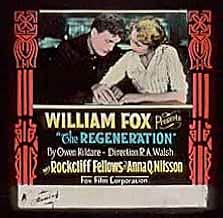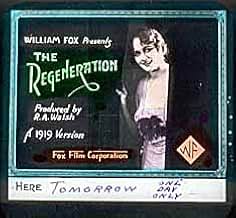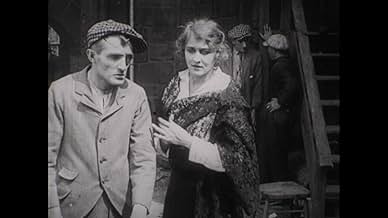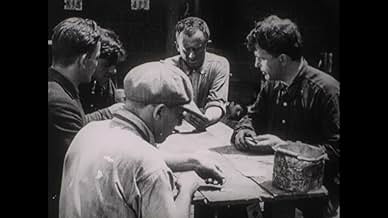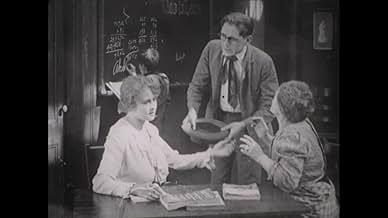NOTE IMDb
6,8/10
1,5 k
MA NOTE
Ajouter une intrigue dans votre langueA boy surrounded by violence grows up to become an infamous gangster.A boy surrounded by violence grows up to become an infamous gangster.A boy surrounded by violence grows up to become an infamous gangster.
- Réalisation
- Scénario
- Casting principal
- Récompenses
- 1 victoire au total
James A. Marcus
- Jim Conway
- (as James Marcus)
Harry McCoy
- Owen - Age 17
- (as H. McCoy)
Peggy Barn
- Woman
- (non crédité)
William Dyer
- Drunk Friend of Jim Conway
- (non crédité)
Avis à la une
Directed by Raoul Walsh, this is an exciting and poetic film, using all the elements at play in his greatest movies. Those signatures really stand out, even all the way back at the beginning of his career.
It's the story of a tenement street kid who loses his kindly mother at age 10. (The scene that starts the film is quite moving. This is not to be a comic adventure film, but a very serious drama). The boy is taken in by a neighbor woman, a harridan, but a kind hearted one whose husband is a drunkard who beats her and the boy every chance he gets. The boy starts to lose whatever humanity he had, due to the influence of this battling couple.
He rises to a position of 'prominence' in the tenement community over the years, since he has all the things that the denizens of the street find attractive - a devil may care attitude, a sense of daring, a lot of strength and good looks. He's never lost his inner gentle nature, but it's hidden under a mask of bravado and cynicism that he needs to survive. The actor, Rockcliffe Fellowes, looks like a cross between Marlon Brando, Jimmy Cagney and Jason Segal. He's quite good... in fact he totally reminds me of Brando in THE WILD ONE. The camera loves him. As Owen, he's able to play both sensitive and tough, which is a magic combination for Walsh.
He falls for Marie whom he calls Mamie Rose (Anna Q.Nilsson), a wealthy girl who is being groomed by her parents for marriage to the city's new District Attorney. The DA has just been appointed and tells all the newspapers that he is cracking down on crime. One night, the girl tells the DA that she wants to see what the street toughs are like for herself. The DA tells her and her friends that he knows a dive where they can see all the lowlifes they want to. Of course, after having his picture in the papers all over town, the DA is immediately recognized and the crowd starts to heckle him showing him how tough they really are. The girl cries out for someone to help the foolish DA, and our Owen breaks up the crowd and leads them to safety. Owen is smitten, and Mamie is struck hard with the need to help the poor and destitute.
She immediately starts work in the neighborhood, doing good deeds and handing out medicine and money to the needy. The rest is just about what you would think a Walsh film would be, with Owen trying to make good out of unrequited love for Marie, who doesn't really realize his feelings. He finds inspiration to become better educated and make something of himself through her ministrations. She turns to him as a pillar of strength when things go wrong.
His loyal pal, a street kid who has a deformity who Owen once saved from being made fun of, is a splendid actor. All of the street toughs really look like street toughs, which is refreshing and a bit scary. Walsh builds up the action in a very similar way to The Roaring Twenties, with a really evil gang leader who takes over when Owen tries to goes straight. There was a surprise ending, for me anyway.This film was very well done for the time it was made and I can see how it made Walsh famous. It made me love him all the more for his sensitivity and realism.
It's the story of a tenement street kid who loses his kindly mother at age 10. (The scene that starts the film is quite moving. This is not to be a comic adventure film, but a very serious drama). The boy is taken in by a neighbor woman, a harridan, but a kind hearted one whose husband is a drunkard who beats her and the boy every chance he gets. The boy starts to lose whatever humanity he had, due to the influence of this battling couple.
He rises to a position of 'prominence' in the tenement community over the years, since he has all the things that the denizens of the street find attractive - a devil may care attitude, a sense of daring, a lot of strength and good looks. He's never lost his inner gentle nature, but it's hidden under a mask of bravado and cynicism that he needs to survive. The actor, Rockcliffe Fellowes, looks like a cross between Marlon Brando, Jimmy Cagney and Jason Segal. He's quite good... in fact he totally reminds me of Brando in THE WILD ONE. The camera loves him. As Owen, he's able to play both sensitive and tough, which is a magic combination for Walsh.
He falls for Marie whom he calls Mamie Rose (Anna Q.Nilsson), a wealthy girl who is being groomed by her parents for marriage to the city's new District Attorney. The DA has just been appointed and tells all the newspapers that he is cracking down on crime. One night, the girl tells the DA that she wants to see what the street toughs are like for herself. The DA tells her and her friends that he knows a dive where they can see all the lowlifes they want to. Of course, after having his picture in the papers all over town, the DA is immediately recognized and the crowd starts to heckle him showing him how tough they really are. The girl cries out for someone to help the foolish DA, and our Owen breaks up the crowd and leads them to safety. Owen is smitten, and Mamie is struck hard with the need to help the poor and destitute.
She immediately starts work in the neighborhood, doing good deeds and handing out medicine and money to the needy. The rest is just about what you would think a Walsh film would be, with Owen trying to make good out of unrequited love for Marie, who doesn't really realize his feelings. He finds inspiration to become better educated and make something of himself through her ministrations. She turns to him as a pillar of strength when things go wrong.
His loyal pal, a street kid who has a deformity who Owen once saved from being made fun of, is a splendid actor. All of the street toughs really look like street toughs, which is refreshing and a bit scary. Walsh builds up the action in a very similar way to The Roaring Twenties, with a really evil gang leader who takes over when Owen tries to goes straight. There was a surprise ending, for me anyway.This film was very well done for the time it was made and I can see how it made Walsh famous. It made me love him all the more for his sensitivity and realism.
In cinema, 1915 is best known as the year of DW Griffith's epic Birth of a Nation. While I won't play down the talents and achievements of Griffith, his debut feature was merely a culmination of his prior achievements, a milestone in cinema culture but adding nothing to cinematic language. Regeneration however, a largely overlooked film (although it has its champions), was perhaps truly the most important picture of that year.
Raoul Walsh, previously an assistant to Griffith, and already having a handful of short features to his name, made his full-length debut with this romantic gangster fable. The picture opens fairly conventionally for the time, Walsh displaying an incredibly firm grasp of film form for such a young director. The opening shot establishes the mood - the recently bereaved protagonist sitting alone in a bare room, a curtain billowing forlornly behind him, after which we cut away to the hearse bearing his mother in the street outside. However, we then see the lad go to the window and look down. In the very next shot, the camera is looking down at the hearse, exactly as he would see it. Bam! The point-of-view shot is born.
The point-of-view shot is not merely a convenient alternative angle for storytelling. It places the audience into the position of the character. It's something unique to cinema you can't recreate that in the theatre. The only real equivalent is in novels, when the narrative is told from a character's perspective. Walsh here gives cinema that ability, and moves the audience from the position of spectator to that of participant. It's particularly apt too for Regeneration, as it was adapted from an autobiography. Walsh remains consistent to the story's roots by primarily showing the points of view of the protagonist, Owen.
Another great thing about Regeneration is its use of dolly shots that is, moving the camera in or out, towards or away from the action. This wasn't an innovation as such, the dolly having been invented by Giovanni Pastrone for his 1914 epic Cabiria, but the dolly shots in that picture are largely uninspired, at best creating smooth transitions between different length shots. Walsh however really explores the possibilities of the technique. First he uses it to home in on the young Owen in the scene where his adoptive parents argue over the dinner table. Again this is a move which draws us into the character's world, as if we are being pulled forward and forced to look. Much later, in the scene where Anna Q. Nilsson bursts into the gangster's den, the camera itself rushes forward, reaching the centre of the shot at the same pace she does. In effect, the camera movement mimics hers and gives the audience a little taste of her sense of urgency.
Needless to say, there is a lot more to Regeneration than these pioneering camera techniques. Walsh's handling of the dynamic moments is particularly adept, with a climactic ride-to-the-rescue worthy of Griffith, and some particularly realistic fight scenes. But he was just as capable of great tenderness as he was of great action, and the picture is shot through with the sense of melancholy romanticism that is typical of Walsh. And let's not forget the fine naturalistic acting on display, although stars Rockliffe Fellowes and Anna Q. Nilsson would soon fade into obscurity.
By way of a disclaimer, I should point out that Regeneration may not literally be the first motion picture to use point-of-view shots. There was, after all, a wealth of experimentation in the early days of cinema, and many films are obscure or lost. It is shortly after this though that the technique seems to enter mainstream usage. For example, Cecil B. DeMille's The Cheat, made several months after Regeneration, features point-of-view shots, whereas DeMille's Carmen, made about the same time as Regeneration, does not. Tag Gallagher, in his superb essay on Walsh for Senses of Cinema, makes similar claims. Whatever the case, Walsh certainly excelled in a new kind of cinema, one which placed the audience inside the story, and this principle would shape much of Walsh's work throughout his fifty-year career.
Raoul Walsh, previously an assistant to Griffith, and already having a handful of short features to his name, made his full-length debut with this romantic gangster fable. The picture opens fairly conventionally for the time, Walsh displaying an incredibly firm grasp of film form for such a young director. The opening shot establishes the mood - the recently bereaved protagonist sitting alone in a bare room, a curtain billowing forlornly behind him, after which we cut away to the hearse bearing his mother in the street outside. However, we then see the lad go to the window and look down. In the very next shot, the camera is looking down at the hearse, exactly as he would see it. Bam! The point-of-view shot is born.
The point-of-view shot is not merely a convenient alternative angle for storytelling. It places the audience into the position of the character. It's something unique to cinema you can't recreate that in the theatre. The only real equivalent is in novels, when the narrative is told from a character's perspective. Walsh here gives cinema that ability, and moves the audience from the position of spectator to that of participant. It's particularly apt too for Regeneration, as it was adapted from an autobiography. Walsh remains consistent to the story's roots by primarily showing the points of view of the protagonist, Owen.
Another great thing about Regeneration is its use of dolly shots that is, moving the camera in or out, towards or away from the action. This wasn't an innovation as such, the dolly having been invented by Giovanni Pastrone for his 1914 epic Cabiria, but the dolly shots in that picture are largely uninspired, at best creating smooth transitions between different length shots. Walsh however really explores the possibilities of the technique. First he uses it to home in on the young Owen in the scene where his adoptive parents argue over the dinner table. Again this is a move which draws us into the character's world, as if we are being pulled forward and forced to look. Much later, in the scene where Anna Q. Nilsson bursts into the gangster's den, the camera itself rushes forward, reaching the centre of the shot at the same pace she does. In effect, the camera movement mimics hers and gives the audience a little taste of her sense of urgency.
Needless to say, there is a lot more to Regeneration than these pioneering camera techniques. Walsh's handling of the dynamic moments is particularly adept, with a climactic ride-to-the-rescue worthy of Griffith, and some particularly realistic fight scenes. But he was just as capable of great tenderness as he was of great action, and the picture is shot through with the sense of melancholy romanticism that is typical of Walsh. And let's not forget the fine naturalistic acting on display, although stars Rockliffe Fellowes and Anna Q. Nilsson would soon fade into obscurity.
By way of a disclaimer, I should point out that Regeneration may not literally be the first motion picture to use point-of-view shots. There was, after all, a wealth of experimentation in the early days of cinema, and many films are obscure or lost. It is shortly after this though that the technique seems to enter mainstream usage. For example, Cecil B. DeMille's The Cheat, made several months after Regeneration, features point-of-view shots, whereas DeMille's Carmen, made about the same time as Regeneration, does not. Tag Gallagher, in his superb essay on Walsh for Senses of Cinema, makes similar claims. Whatever the case, Walsh certainly excelled in a new kind of cinema, one which placed the audience inside the story, and this principle would shape much of Walsh's work throughout his fifty-year career.
By the standards of its time, this is a better than average film, and it is still watchable, even though the social and cinematic conventions of 1915 may make it rather quaint to some viewers. Still, the theme about a good woman regenerating a rascal is not unusual today, and here it is told with coherence and simplicity.
One may find the acting style quaint, too, but some of the worst excesses of the silent days are avoided for the most part. Perhaps we can thank young Raoul for that. The editing is choppy, but that may be due to losses over the years, and it may vary depending on the print or tape translation one sees.
One may find the acting style quaint, too, but some of the worst excesses of the silent days are avoided for the most part. Perhaps we can thank young Raoul for that. The editing is choppy, but that may be due to losses over the years, and it may vary depending on the print or tape translation one sees.
I'm not a lover of silent cinema for a host of reasons, The Regeneration manages to avoid a couple but walks headlong into others.
It tells the tale of a young boy who loses his mother at a tender age, he's raised into violence and poverty and finds himself as an adult engaging in criminal activity. But when a kind hearted lady enters his life he finds himself questing for change, but can he escape his past?
The first thing that struck me about The Regeneration was how stunning it looks, there are movies made decades after this that don't look this good. The camera work is oddly crisp, the cinematography excellent and the performances are considerably less hammy than you'd expect from this era.
I feel like the movie would have been best served as a short, maybe at a 30-40 minute length. As a feature it dragged and the soundtrack though superior to most of it's ilk really does begin to grind on you.
The Regeneration is a wonderful attempt and one of the best of its type that I've seen, alas certain tropes of the genre that I despise meant it could only go so far.
The Good:
Looks incredible for its time
Great finale
The Bad:
Music gets old
Drags around the middle
It tells the tale of a young boy who loses his mother at a tender age, he's raised into violence and poverty and finds himself as an adult engaging in criminal activity. But when a kind hearted lady enters his life he finds himself questing for change, but can he escape his past?
The first thing that struck me about The Regeneration was how stunning it looks, there are movies made decades after this that don't look this good. The camera work is oddly crisp, the cinematography excellent and the performances are considerably less hammy than you'd expect from this era.
I feel like the movie would have been best served as a short, maybe at a 30-40 minute length. As a feature it dragged and the soundtrack though superior to most of it's ilk really does begin to grind on you.
The Regeneration is a wonderful attempt and one of the best of its type that I've seen, alas certain tropes of the genre that I despise meant it could only go so far.
The Good:
Looks incredible for its time
Great finale
The Bad:
Music gets old
Drags around the middle
Raoul Walsh had just come off _The Birth of a Nation_ both as one of Griffith's assistant directors and as an actor (most prominently as John Wilkes Booth), when he made this film. In his autobiography, Walsh credits Griffith with "teaching" him not only about much of the art of fiction filmmaking, but also about production management technics that aided him in taking full advantage of many of New York City's most pictorial exterior locations.
The locations play an important role in adding to the naturalism of an otherwise highly melodramatic plot with the high society young woman turned heroine social worker (much overplayed by a major star of the 1910s, Anna Q Nilsson) and the regeneration of the one-time Lower Manhatan gang leader.
The wonder of this film is the performance of the male "star", Rockliffe Fellowes, who played in over a dozen nearly unremembered films until he died in 1950. His performance is so subtly varied and electrically alive that one is reminded of Brando in his early 1950s films. An interesting sidenote about his performance: The movieola film editing machine -- that magnified the small 35mm frame to about 4 inches by 6 inches as it ran the film stock through the viewer at the proper projection speed -- was not invented until much later. In 1915, editors had to hold the footage up to the light to see each frame and/or use a magnifying glass; but they could not also run the film at speed at the same time. Hence, many of the subtlest nuances that cross the hero's face could not be clearly seen and judged in editing: _Regeneration's_ editor often cuts away before the movement has settled, or cuts into a close or medium shot of the hero after the nuance has already begun.
Watching the film on a large screen today, one is aware how powerful present-day editing technics are at capturing all such movements in the hands of a skilled editor. In _Regeneration_ there is a distinct feeling of rough editing at the moments we leave or cut to the hero at the "wrong" instant. By the way, the original title was NOT _The Regeneration_, but _Regeneration_ alone. From which we can surmise that Walsh was looking to create a work with universal meaning.
The locations play an important role in adding to the naturalism of an otherwise highly melodramatic plot with the high society young woman turned heroine social worker (much overplayed by a major star of the 1910s, Anna Q Nilsson) and the regeneration of the one-time Lower Manhatan gang leader.
The wonder of this film is the performance of the male "star", Rockliffe Fellowes, who played in over a dozen nearly unremembered films until he died in 1950. His performance is so subtly varied and electrically alive that one is reminded of Brando in his early 1950s films. An interesting sidenote about his performance: The movieola film editing machine -- that magnified the small 35mm frame to about 4 inches by 6 inches as it ran the film stock through the viewer at the proper projection speed -- was not invented until much later. In 1915, editors had to hold the footage up to the light to see each frame and/or use a magnifying glass; but they could not also run the film at speed at the same time. Hence, many of the subtlest nuances that cross the hero's face could not be clearly seen and judged in editing: _Regeneration's_ editor often cuts away before the movement has settled, or cuts into a close or medium shot of the hero after the nuance has already begun.
Watching the film on a large screen today, one is aware how powerful present-day editing technics are at capturing all such movements in the hands of a skilled editor. In _Regeneration_ there is a distinct feeling of rough editing at the moments we leave or cut to the hero at the "wrong" instant. By the way, the original title was NOT _The Regeneration_, but _Regeneration_ alone. From which we can surmise that Walsh was looking to create a work with universal meaning.
Le saviez-vous
- AnecdotesMost of the extras in this film were real locals from the Bowery area, as well as from Hell's Kitchen, and had never appeared before in films. Most of the gangster characters were actual gangsters in real life.
- Citations
District Attorney Ames: Very fine and loyal, my boy, but you can't save your friend, and you have lost whatever chance you had - with her.
- Crédits fousThere is no cast list during the opening credits or at the end. Actors, however, are credited by intertitles as they appear within the movie, and that is used for the IMDb cast ordering. Actors never mentioned are marked uncredited.
- Versions alternativesKino International released a version which runs 72 minutes and contains an uncredited piano score.
Meilleurs choix
Connectez-vous pour évaluer et suivre la liste de favoris afin de recevoir des recommandations personnalisées
Détails
- Date de sortie
- Pays d’origine
- Langue
- Aussi connu sous le nom de
- Régénération
- Lieux de tournage
- Hudson River, Nyack, New York, États-Unis(burning of the excursion barge)
- Société de production
- Voir plus de crédits d'entreprise sur IMDbPro
- Durée
- 1h 12min(72 min)
- Couleur
- Mixage
- Rapport de forme
- 1.33 : 1
Contribuer à cette page
Suggérer une modification ou ajouter du contenu manquant

